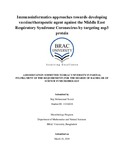Immunoinformatics approaches towards developing vaccine/therapeutic agent against the Middle East Respiratory Syndrome Coronavirus by targeting nsp3 protein

View/
Date
2019-03-28Publisher
Brac UniversityAuthor
Tanvir, Niaj MohammadMetadata
Show full item recordAbstract
MERS coronavirus is an emerging virus which causes Middle East respiratory syndrome. MERS
outbreak has been appearing in 27 different countries over a span of around six years with a
mortality rate greater than 35% and claimed over 800 lives in the process. However, there is not
any clinically approved vaccine or therapeutic agent available for treatment of MERS. Therefore,
it is crucial to design an effective vaccine or therapeutic agents against MERS coronavirus. This
study aimed to find vaccines/therapeutic agents against MERS coronavirus using
immunoinformatics which could reduce both time and cost needed for laboratory analysis and
vaccine development. Since nsp3 protein is an essential component of the replication/transcription
complex of MERS coronavirus, the discovery of an nsp3 inhibitor will be a major leap towards
developing an anti-viral agent that can interfere with MERS coronavirus replication. In the present
study, two different strategies were explored. The first strategy was to design an epitope-based
vaccine. For designing an epitope-based vaccine, nsp3 protein sequence was extracted from the
NCBI database and then the sequence was put in T-cell and B-cell epitope prediction servers to
generate a list of potential T-cell and B-cell epitope candidates. T-cell and B-cell epitope
candidates are then screened using several software and tools. FAFETGLAY appeared to be the
best T-cell epitope candidate. However, the only drawback was that FAFETGLAY was found as
an allergen in allergenicity prediction tools. FVDWRSYNYAVSSAFWLF,
LKFKEVCKTTTGIPEY and LKFKEVCKTTTGIPEYNF showed promise as epitope candidates
for peptide-based vaccine design among the selected B-cell epitopes. The second strategy was
focused on identifying effective flavonoids that can be used as nsp3 inhibiting therapeutic agents
against MERS coronavirus. In this study, 18 flavonoids were selected as potential nsp3 inhibitor
candidates and their anti-viral activities were assessed using molecular docking study. Molecular
docking study revealed that among 18 flavonoids, apiin and naringin exhibited the most potent
antiviral activity against MERS coronavirus nsp3 protein as they showed the best binding affinity
of -10.1 kcal/mol which was higher than the binding affinity of ADP-ribose. In addition, apiin and
naringin had the lowest Ki value of 0.0390649 μM. Furthermore, the molecular visualization of
the docked complexes suggested that both apiin and naringin formed three or more hydrogen bonds
ranging from moderate to weak. Therefore, apiin and naringin can be considered good candidates
for further evaluation as potential anti-viral agents against MERS-CoV.
